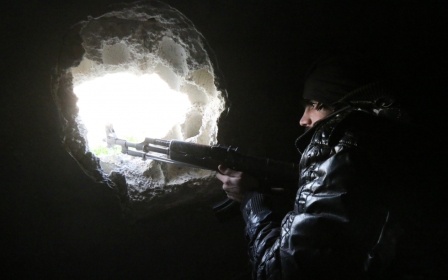UN calls for end to Syria barrel bombs, sieges on civilians

Denouncing a business-as-usual approach to Syria, UN chief Ban Ki-moon called on Thursday for urgent action to lift sieges on civilians and to end barrel bomb attacks.
The appeal came in a report by the UN secretary general to the Security Council that also made the case for stepped-up efforts to reach a political solution and end the nearly four-year war.
"This conflict has become business as usual," Ban wrote in the report, obtained by AFP.
The UN chief listed five priorities for action including the lifting of sieges on 212,000 people, ensuring access to medical aid to all of Syria and rebuilding the education system.
He also said the 15-member council must address barrel-bomb attacks on civilians and ending the practice of denying services as a weapon of war.
The report was the 12th to the council, which has been deeply divided over the war that has left more than 210,000 dead and displaced 12 million Syrians.
Russia, President Bashar al-Assad's ally, has blocked moves to punish the regime for the worsening violence.
Ban reported a significant escalation of violence and attacks by government forces during January in Damascus, rural Damascus and in eastern Ghouta.
Assad's forces conducted aerial bombardments including with barrel bombs, shelled the area of eastern Ghouta and launched surface-to-surface missiles, the report said.
In a BBC interview this month, Assad flatly denied that his forces were using barrel bombs, describing such claims as a "childish story."
"I haven't heard of (the) army using barrels, or maybe cooking pots," Assad said, laughing.
"We have bombs, missiles and bullets," he added, dismissing claims his forces were using indiscriminate weapons.
Ban said barrel bombs were used against civilians in Aleppo, where the United Nations is seeking to freeze fighting as part of peace efforts.
Assad's forces are besieging 185,500 people in eastern Ghouta, Darayya and Yarmouk while armed opposition groups in Nabul and Zahraa are preventing 26,500 people from gaining access to food and other supplies, the report said.
Ban said the crisis is worsening for Syrians after nearly four years of war and issued fresh appeals for a political solution.
"Defining a political solution will involve tough decisions and compromise, with everyone putting aside their preconditions for launching talks," Ban said.
The Security Council is due to discuss the humanitarian crisis in Syria during a meeting next week.
UN urges Assad to release detainees
Meanwhile, the UN human rights chief on Thursday urged the Syrian authorities to release all activists, lawyers and other detainees they have been holding without due process, including some jailed for years.
UN High Commissioner for Human Rights Zeid Ra'ad Al-Hussein estimated that between tens of thousands and hundreds of thousands of people have been held at some point in government jails since the first anti-Assad protests erupted in Syria nearly four years ago.
"I urge the Syrian government to immediately release all those who have been jailed for peaceful expression of their views and to ensure that all those detained are accorded their full due process rights," Zeid said in a statement.
He made a special plea for the release of prominent lawyer Mazen Darwish, who was arrested on February 16, 2012 along with Hani Zaitani and Hussein Ghreir, his colleagues at the Syrian Centre for Media and Freedom of Expression (SCM).
"Last month, their trial was postponed for the sixth time with no new hearing date set," Zeid said.
Human rights groups in the last few days also launched a new campaign for the release of Darwish, Zaitani and Ghreir.
"In many cases, people are held incommunicado for weeks or months, in particular by political security, state security, military security and air force intelligence branches," Zeid added.
"This is particularly worrying given the Syrian government’s record of torture and ill-treatment of detainees, which has been well-documented prior to, and during, the conflict," the high commissioner said.
The anti-government protests that erupted in March 2011 were met by a deadly government crackdown before a civil war broke out.
Zeid's office said militias linked to the government have also abducted activists at checkpoints throughout the country before holding them in their own facilities where they face torture and ill-treatment.
Zeid said detainees who were released reported that they were held in cells of no more than six metres by seven metres at the Political Security Branch, with up to 55 prisoners per cell and without enough food or medical care.
"They described the use of torture rooms and equipment as well as the extreme cruelty of interrogators," he said.
Stay informed with MEE's newsletters
Sign up to get the latest alerts, insights and analysis, starting with Turkey Unpacked
Middle East Eye delivers independent and unrivalled coverage and analysis of the Middle East, North Africa and beyond. To learn more about republishing this content and the associated fees, please fill out this form. More about MEE can be found here.




